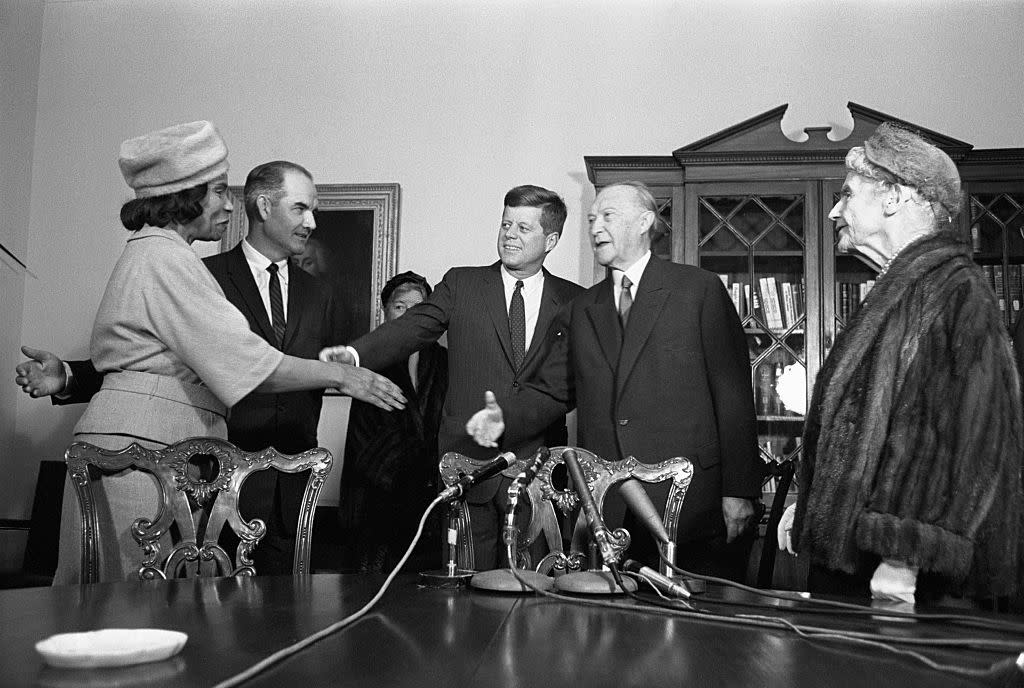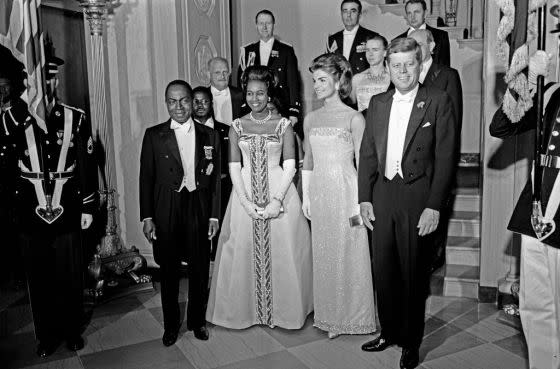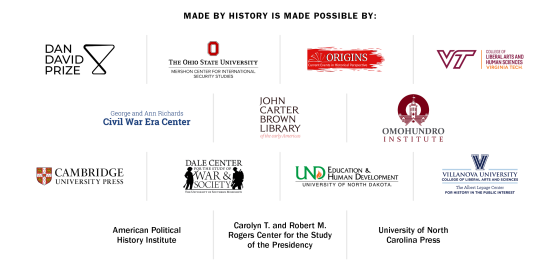The Cultural Politics Behind America's Continuing Fascination With JFK

- Oops!Something went wrong.Please try again later.
- Oops!Something went wrong.Please try again later.
Chancellor Konrad Adenauer, arriving at the White House in 1961 for his final conference with President Kennedy, is introduced by the President to directors of the U.S. Freedom from Hunger campaign. Pictured (L to R) are: Singer Marian Anderson; George McGovern, Director of Food for Peace; Kennedy; Adenauer; and Mrs. Woodrow Wilson, widow of the World War I President. Credit - Bettmann Archive/Getty Images
The 60th anniversary of President John F. Kennedy’s assassination reignites longstanding debates about his legacy and the effectiveness of the former president’s tenure in office. Key to understanding his enduring impact is his cultural agenda, which Kennedy intentionally used to construct the ideological groundwork for his administration and the changes he hoped to implement.
Presidents have long understood culture as a powerful weapon to executing their policy. In the early years of the republic, President George Washington implemented administrative etiquette to invoke respect for the institution of the presidency from both the electorate and foreign powers. He created specific protocols for guest visitation, which granted visitors access to the president while simultaneously upholding the dignity and decorum that Washington believed necessary for the fledgling nation’s new government.
Kennedy adopted that approach when he took the oath of office in 1961. While the founding generation used administrative protocol, classical symbols, architecture, and paintings to articulate America’s burgeoning political values, Kennedy championed American innovation and technological advancement and exhibited the best in American art, poetry, theater, music, cuisine (inspired by French tradition), and furnishings to demonstrate the nation’s readiness for its responsibility as global leader. In his inaugural address, Kennedy asserted that America’s “revolutionary beliefs” about the natural rights of mankind were contested around the globe. He promised “to assure the survival and the success of liberty.”
However, as he spoke, U.S. citizens faced the realities of discrimination. Even after the 1954 Brown v Board of Education ruling that condemned segregation in public schools, African Americans still sought equal access to public facilities, voting polls, educational institutions, employment opportunities, and reliable housing.
Read More: What These 3 Longstanding JFK Myths Reveal About America
Although Kennedy did not explicitly discuss this issue as he launched his presidency, he seemed to inadvertently express his personal feelings on the issue by using a cultural strategy. On Inauguration Day, Kennedy hosted two American cultural icons who symbolized his commitment to integration. African American contralto Marion Anderson sang “The Star Spangled Banner” and four-time Pulitzer recipient Robert Frost prepared an original poem that called the administration “a golden age of poetry and power” before reciting “The Gift Outright,” a poem about American continuity and progress.
The following February, Kennedy returned to the same strategy, inviting Grace Bumbry, an African American opera singer, to perform at the White House during a dinner honoring the nation’s Vice-President, House Speaker, and Chief Justice. Then in May, he hosted a state dinner for President and Mrs. Houphouët-Boigny of Africa’s Ivory Coast.

In September, President Kennedy finally took more decisive action on civil rights as he sent federal troops to end rioting as African American Air Force veteran James Meredith attempted to attend classes at the University of Mississippi. In 1963, the president federalized Alabama’s National Guard in response to Governor George Wallace’s refusal to integrate the University of Alabama. Kennedy also sent troops to Birmingham after its city commissioner, Eugene “Bull” Connor used dogs and high-powered water hose on protestors.
Still, Kennedy did not openly advocate for a civil rights bill until June 1963. Though the legislation he initiated gained bipartisan support in Congress, the Civil Rights Act of 1964 and the Voting Rights Act of 1965 passed after his assassination under his successor, Lyndon Johnson. Kennedy’s delay in advocating for a Civil Rights bill and his inability to pass it during his tenure is considered one of the major shortcomings of his presidency, but the cultural pathways he launched and policies he introduced were seminal to preparing the nation for this legislation.
Kennedy also used culture to revamp his foreign policy strategies after an early setback with the Bay of Pigs fiasco, an ill-fated attempt in April 1961 to oust Fidel Castro and purge Communism from Cuba. Since Castro had a relationship with Soviet leader Nikita Khrushchev, Kennedy believed that interfering in Cuba would give the U.S. an advantage in the Cold War. But providing weapons, training and strategy to Cuban exiles proved insufficient and the attempted overthrow of Castro’s government failed.
Read More: What We Know and Still Don’t Know about JFK’s Assassination
Six months after the Bay of Pigs, Kennedy used culture to reiterate his commitment to the concept of representative governments south of the border. On Nov. 13, 1961, he hosted a White House dinner for Luis Muñoz Marin, Puerto Rico’s first democratically elected governor. After dinner, Muñoz Marin’s friend, Pablo Casals, the celebrated and accomplished Spanish violinist and composer, played in the East Room of the White House. This was Casals’ first trip to the U.S. since 1928. He had been boycotting the U.S. because of America’s previous support of Generalissimo Francisco Franco, the Spanish dictator. Having the privilege of hosting both Casals and Muñoz Marin at the White House presented both cultural and political victories for the administration.
Another key moment came on April 11, 1962, when the Kennedys hosted a White House dinner honoring each of the Nobel Prize winners in the Western Hemisphere. This event occurred two months after John Glenn became the first American to orbit earth on Feb. 20, 1962. Glenn’s achievement and the honoring of Nobel Prize recipients at the White House spoke to the president’s inaugural musings about “invoking the wonders of science instead of its terror,” as well as his May 25, 1961, appeal to Congress for funds to build an American space program with a goal of “landing a man on the moon and returning him to earth safely” before the end of the decade.

Perhaps the clearest statement about the importance of culture in policymaking came in the spring of 1962. That’s when President Kennedy created a Special Consultant on the Arts position to provide insight on federal projects associated with both policy and the arts. He also endorsed a report titled Guiding Principles for Federal Architecture, which stated that new federal architecture must provide “visual testimony to the dignity, enterprise, vigor, and stability of the American government.”
In short, the Kennedy administration’s use of culture may be one of the reasons why Kennedy’s presidency still evokes so much interest — despite his abbreviated time in office. The president once explained that “there is a connection between achievement in public life and progress in the arts.” His intentional use of culture presented his leadership as more than a presidential administration.
“Camelot,” as Jacqueline Kennedy called her husband’s presidency, was also a realm of ideas that permeated the nation’s psyche with a collective sense of possibilities and responsibilities about what the nation could continually achieve through both politics and culture.
Camille Davis is the H. Ross Perot Sr. postdoctoral fellow at the Center for Presidential History in Dallas and a two-time former fellow of the Winterthur Museum, Garden and Library in Delaware. Her specialization is American intellectual and visual history. Made by History takes readers beyond the headlines with articles written and edited by professional historians. Learn more about Made by History at TIME here.
Write to Made by History at madebyhistory@time.com.

